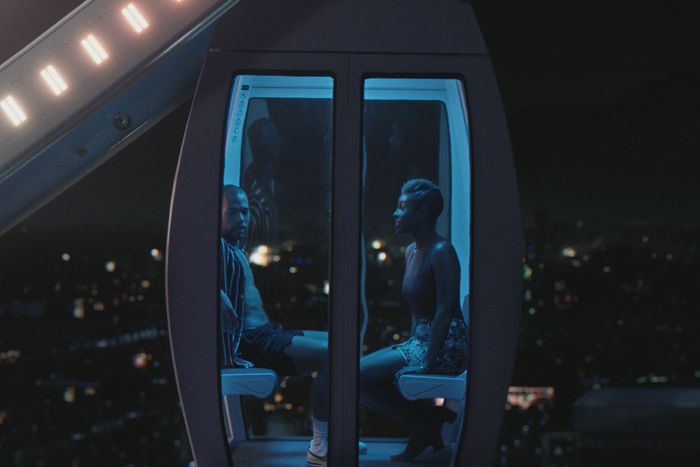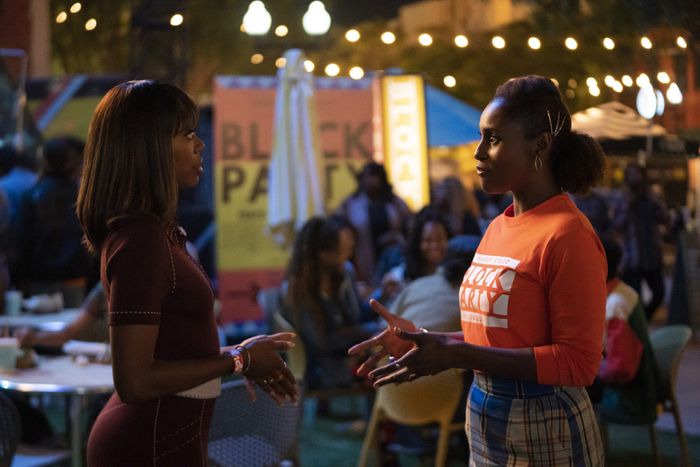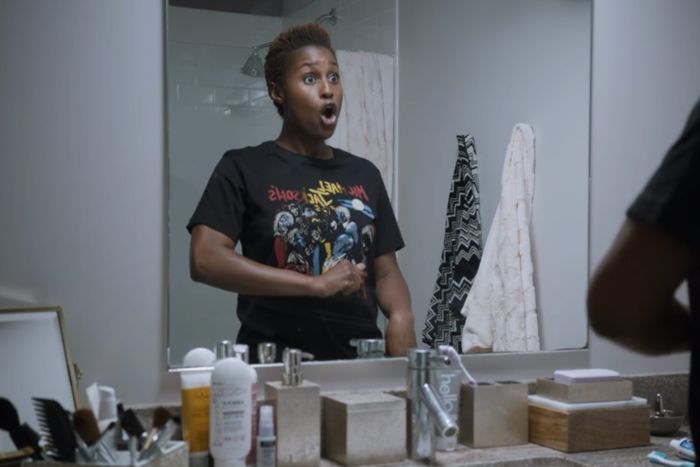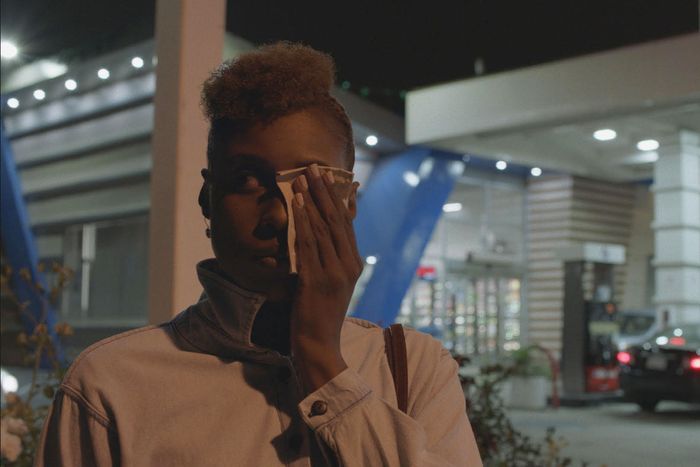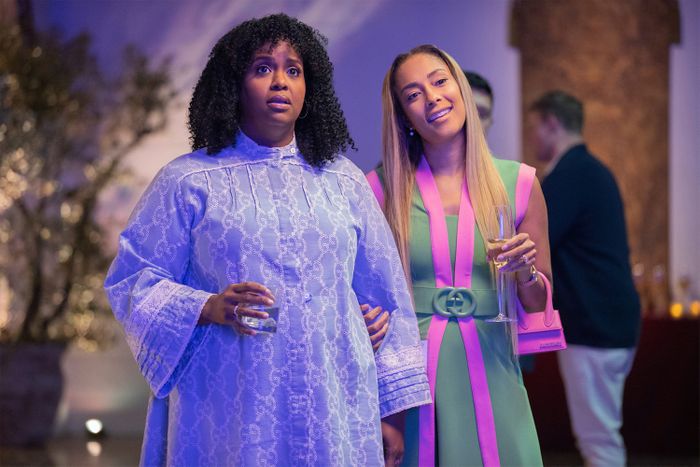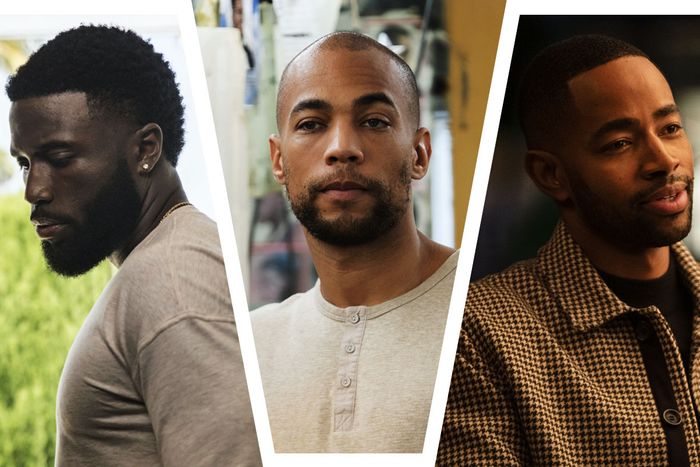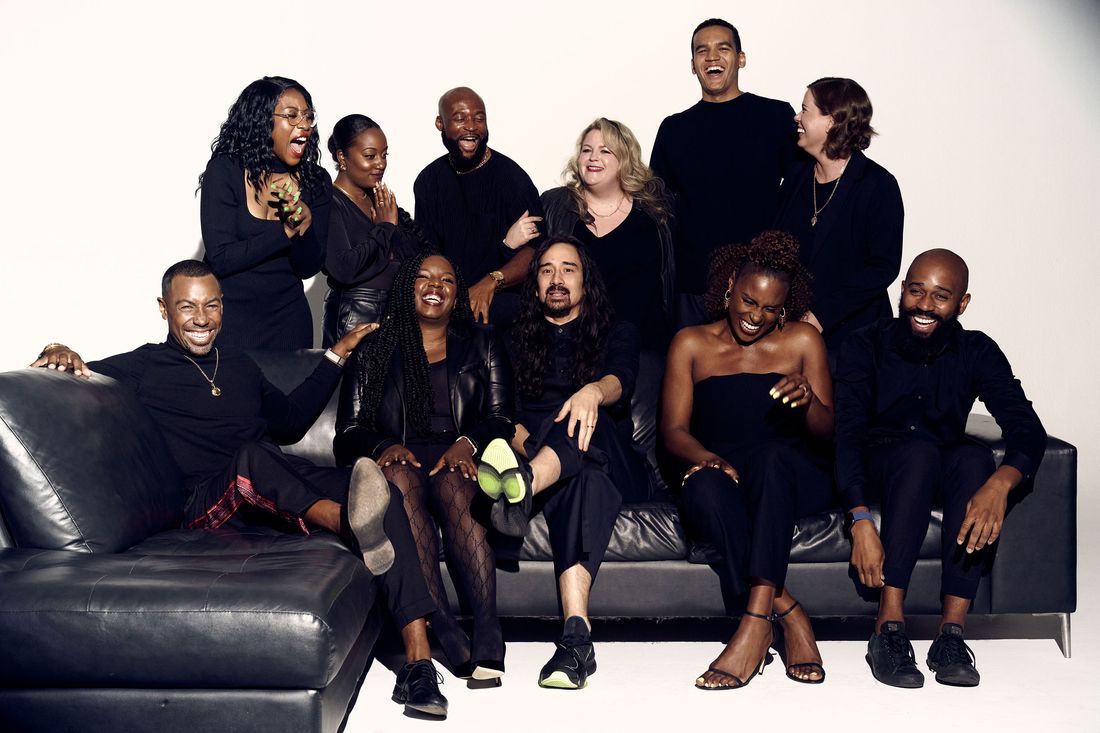
After five years, five seasons, and two presidential administrations, Insecure is getting out while the getting is still good. A classic of the new Black television renaissance, the HBO sitcom chronicled the triumphs and mishaps of messy 30-something Issa Dee, centering the lives, loves, struggles, and joys of Black millennials unlike any other show of its time. Now, Insecure’s final run of episodes finds its characters at the biggest crossroads of their personal and professional lives, giving Issa; her best friend, Molly; her on-again, off-again partner Lawrence; and the rest of the gang one last chance to figure out if they’ll all be okay.
That’s not stopping it from generating its signature brand of extremely niche controversy. Creator and star Issa Rae never wanted it to be “a Twitter-topic show,” but the series invariably drove the cultural conversation throughout its run, sparking intense debates about open marriages, messy breakups, and most recently, “authentic” sorority representation. Not since the halcyon days of Shonda Rhimes’s TGIT lineup was Twitter ablaze this routinely. Led by Rae and showrunner Prentice Penny, the Insecure writers’ room wasn’t necessarily out to start conversations; whether discussing a surprise threesome, interracial dating, or bitter fights with friends, the writers mined their own lives and experiences to ensure the characters’ choices felt real, instinctive, and most of all, defensible.
For the final season, Rae, Penny, and the team of ten writers — Amy Aniobi, Laura Kittrell, Phil Augusta Jackson, Jason Lew, Grace Edwards, Fran Richter, Eli Wilson Pelton, Syreeta Singleton, Kindsey Young, and Mike Gauyo — were tasked with crafting a fond farewell to a show whose roots stretch back to 2011’s The Mis-Adventures of Awkward Black Girl. And they had to do it all on Zoom. Here, they gather to reflect on the whole journey, laughing easily and often as they called up one another’s memories, revisited the “sexplosion” discourse, and took a final vote in the Team Lawrence vs. Team Daniel debate.
What was it like to work in a Zoom writers’ room this season?
Issa Rae: The fuckin’ worst. So much of a comedy room’s dynamic is in the jokes and looks you share with people, and to not know, like, I made that joke for them. Did they get it? It sucked, and things took a lot longer. It was pretty devastating to write the last season of this show and not be able to even hug. The last day, we were all crying and saying good-bye to each other and I think Kindsey was like, “So we just press ‘Leave Room’ and we’re done?”
Amy Aniobi: On that last day, I walked away — I think I was getting a drink — and I came back and everyone had logged out.
Syreeta Singleton: We were trying to give her a Fresh Prince moment.
Fran Richter: The Will Smith moment.
Kindsey Young: The lights-out switch.
Talk about finding the balance between the humor and the drama of the show.
I.R.: It was always about keeping the show grounded. This wasn’t ever going to be a hard comedy. Even in interviewing writers, that was something we wanted to make clear: I wanted it to feel like how people talk. I love sitcoms, but people talk in jokes, and I’m like, Nobody’s that witty! We were dealing with real-life circumstances while adding a tinge of humor.
We figured out in season one that we were more of a dramedy than just a comedy. By episode five, it becomes a completely different show — it started to lean toward what we wanted the show to be and where it ultimately lived. I remember that first season being pressed for people to stick with the show: Like, okay, they watched episode one. They fuck with it. Just let them get to episode three; they’ll see there’s more to it and it has heart. Okay, they got to episode three. Please! Let them get to episode five! ’Cause episode five, they’ll be locked in — I just know they’ll understand what the show is going to be. And then by the finale, people understood what we were trying to do and were onboard with it.
Phil Augusta Jackson: We were never pitching around, “What’s this big splashy set piece, and how we can we maximize and make it goofy?” It was like, “What would happen in real life? What would the actual tension be?” The bones of the story would feel so true that you insert the comedy on top of that.
I.R.: I will say that the one time we did do a set piece, it ended up being one of our best episodes. Shout out to our old writer, Ben Cory Jones; he wasn’t paying attention in the room. He was on social media during the announcement that Beyoncé was going to be at Coachella, and that led to our Coachella. We were like, We want to go, so let’s try to figure out how to do an episode around it. That was one of our favorite things that we’ve done. But we had to make it relevant to our characters. Otherwise, it wouldn’t have worked.
A.A.: That episode came together so effortlessly. We wrote it in a day because once we keyed into the energy of it, it was like, There’s the story. And once we discovered the Ferris wheel, it was like, Oh, that’s where they fucked!
What percentage of the show comes from your real-life experiences?
A.A.: Like, so much? Molly’s brother dating a girl who has a baby — and then being left with the baby — is my family. That happened to my brother, but they’re together now, and it’s a happy ending. That’s where the best story comes from. We always say these aren’t characters, they’re people, so when we find those moments where we’re nodding together, like, “Oh yeah, that has happened to me” — that always leads to better character development and better story.
I.R.: Issa pretending to not see Molly at Merkato was inspired by something that actually happened to Laura. At our retreat in Palm Springs, in talking about our own friendship breakup, she shared this story, and that was something we immediately knew, like, “Damn, that’s crazy! Let’s find a way to incorporate this.”
Prentice Penny: There’s a moment in episode six when Issa goes to her mom’s house and she’s like, “Baby, what’s wrong?” That was a story one of the writers told in the room that happened to them. Their mom could just tell what was wrong. She was like, “I’m fine, mom!” And the mom was like, “Come here, come here!” We got emotional in the room, and we were like, “We gotta find a space for that moment.”
A.A.: That was kind of our rule: If we all have a strong response to it, then it goes in the show.
Issa, how do you separate Issa the writer from Issa the actress? Have you ever said, “No, I’m not doing that”?
I.R.: I don’t think so? They’ll correct me if I’m wrong, but for the most part, when I’m a writer, I’m fully present and I want to make the best show possible. And then, to my detriment as an actress, I’m like, Oh fuck! I really got to do this! I think season five, I finally got hip to it. Mentally, I would make notes and comments like, Oh shit, well, I don’t want to do that or I don’t wanna be there. I was very conscious about making episodes that didn’t feature me. I think we succeeded in seasons four and five, and those were some of the best seasons to me.
Why was it important to you to do more episodes that didn’t feature you?
I.R.: Oh, that was just laziness. But we’ve always wanted to be able to do a Kelli episode or Lawrence episode or Molly episode, and sometimes they just wouldn’t work with the story. But even as a viewer, I want to live outside of who the main character is. We’ve established a world and made interesting characters.
Are there go-to writers for each character, like someone who’s the Molly whisperer or someone who knows all of Lawrence’s shit?
P.P.: It’s funny: People always ask me when they hear a line or something and they’ll be, “Oh, I know you wrote that line.” I’ll be like, “Nope, actually, Amy wrote that line.” It’s a testament to the talent of the people in the room that you can’t tell who’s saying what, pitching what, doing what. By the time it goes through the process, it’s been through so many filters it might be an amalgamation of three people’s things.
I.R.: I will say that while we were trying to figure out the characters, Lawrence maybe wouldn’t have lasted as long in season one if we did not have Prentice bringing a lot of depth to the character. He has been the “as a man” person for Lawrence, bringing his experiences and making sure he felt like a real guy. Sometimes women write male characters in an idealistic or savage way, like, I’m going to represent everything I hate about my ex or a male friend I’ve had.
Who are you most excited to write for generally?
P.P.: I like writing combinations of people. It’s those characters you can also have comedy with, where you go, Oh, I know where Chad wants Derek’s approval. And Quoia and Issa, who have this idealistic Don Quixote, We’re just gonna go make it happen energy — it’s just fun.
Laura Kittrell: I always like doing the group scenes with the girls. And I don’t know if this is something I like, but I did notice in season one and onward Issa would give me a lot of the sex scenes. Maybe it was because you thought it was funny to make me write the sex scenes more than you thought I’d be really good at it.
I.R.: You were really good at it! You and Fran — our white women are spicy, I’ll tell you that.
What are the rules of writing an Insecure sex scene?
F.R.: Make it hot. When it comes to breathy dialogue, less is more. Always describe what the hands are doing. And if an ass can be gripped, it should be.
I.R.: Did you write the Ferris-wheel scene?
F.R.: I wrote the Ferris-wheel scene. Graphic, but in a tasteful way that’s sexy and not like, Ew. There’s a subtle difference between exciting, sexy, and a little too explicit.
P.P.: Unless it was for comedy.
P.A.J.: It seemed pretty situational. If it’s Issa and Lawrence, it carries more weight than her having sex with TSA bae.
People were really excited about that scene in which Issa and Nathan have sex on a Ferris wheel at Coachella. How did that come about?
F.R.: When we broke the story, it was decided that it would happen up there because it was originally conceived as a big moment for Issa and Nathan — their first physically intimate moment of connection alone. We wanted the experience of the high and the circumstances to set this table for them being vulnerable. We thought, Where can this happen and be fun and sexy and not them sneaking off behind some food stall? The Ferris wheel felt like the perfect scenario.
I.R.: We talked about the Ferris-wheel scene in Fear. It was hot sex, but he was a terrible partner.
S.S.: And there was a moment of vulnerability for both of them. It was Issa’s first time admitting what her dreams were and what she really wanted to create with what would later become her company, the Blocc. And right before they got on the Ferris wheel, she raps in front of him. We went back and forth about Nathan being afraid and that being his vulnerability. But we were like, “You cannot make this man afraid of a Ferris wheel.”
I.R.: Uh-uh, he can’t be no bitch.
P.P.: N- - - -’s afraid of a Ferris wheel …
I.R.: Heights! He was afraid of heights.
I’m curious about the dynamics between the characters. You have all these matchups — Kelli and Tiffany, Issa and Molly, Molly and Andrew. How are you determining how those characters function when they’re interacting with specific characters?
I.R.: Issa and Molly are always the center. We decide, as an arc, what story we want to tell with them. And with something like Kelli and Tiffany, their relationship crumbling informs Issa and Molly’s larger story during that season. But we always start with them as a base, and every other character works around that. Even the Lawrence story will still, for the most part, inform the Issa-and-Molly story or fit into that. That has always been the foundation of every character story.
I was rewatching the pilot, and I realized that Issa and Molly’s relationship has always been more prickly than I had remembered. They’re obviously ride or die, but as we saw in the last season, there is lots of stuff happening underneath that they never addressed.
I.R.: Their friendship is a real friendship. It comes from a real place. That was something Prentice and I were very clear about from season one. We never wanted to take them to a place where they were frenemies. They were two growing people who experienced miscommunications and at some point outgrew each other and did not communicate that effectively. We wanted season four to be a series of paper cuts, and we built them to this point.
With my friends, we come at each other hard. We have a raw honesty with one another, but there’s a base of love. You have to know it’s coming from a place of love; otherwise, that friendship won’t go anywhere. But if my friends came at me at a vulnerable time in my life and I wasn’t ready to receive that, then that friendship wouldn’t last. It just comes down to how honest and vulnerable you’re being with one another. They had to be real friends; otherwise, you’re not rooting for them. You’re not wanting for their friendship to succeed in the end.
Why did you decide to make it smaller, cascading slights rather than one big blowout?
A.A.: It felt more realistic. Especially with your best friend, you’re not often calling out the little things because you have a heart of forgiveness for them. But I will say that for us as writers, we really wanted to make it even — that they were both picking away at each other and not communicating as much, and not as close, and that’s why this breakdown happened. But in reality, after seeing the feedback, we realized, because Issa is the center of the show, the fans naturally gravitate toward defending Issa. There was this huge Fuck Molly we did not anticipate. We were like, “Oh, maybe we should have made Issa a little bit worse and weighted it a little differently.” We didn’t anticipate that response. But I like how we did it. I also think the response came from people seeing themselves in Molly and having a friendship like that.
P.P.: We also never pitted them against each other. It’s always the guys: Team Daniel, Team Lawrence. We never made the audience pick between these two. They might have had a disagreement in season one, but they’re still on the same side. This was the first time they were not on the same side. When we were in the room, we were thinking about the characters existing for three other seasons. We would go into the room and be like, “What are the slights throughout the last three seasons that we’ve seen?” We certainly felt that Issa had done a lot of slights to Molly — certainly more than Molly’s done to Issa. We felt that balanced it out.
F.R.: For us as writers, many of us who have been here multiple seasons, we are thinking about the full history. We were absolutely aware of the way the scales were tipping, but we were keeping the full breadth of the time we’ve spent with them in mind.
Jason Lew: I mean, we had literal scorecards for all episodes. Molly: 1, Issa: 1.
S.S.: We also plotted out — each episode — what was being chipped away at in their relationship: communication, the time that they give one another. We were very intentional about what destroys a friendship. They’re small things.
Eli Wilson Pelton: I thought you were going to say the stages of grief, which we did not stick to.
K.Y.: We had it at the top of each board.
I.R.: On top of every episode: experience, grief, or whatever.
K.Y.: Acceptance!
L.K.: Issa, did you just say you believe two of the stages of grief are experience and grief?
I.R.: Shut up! Laura, focus on what everybody else is saying, okay?
What’s the most difficult scene you worked on?
K.Y.: Season four, episode six, which was post-block-party fight between Issa and Molly. We’re usually writing Issa with Molly in mind and having her bounce her thoughts off Molly, but Molly wasn’t in that episode at all. It was hard to navigate an Issa story with no Molly — just seeing how she roamed the world without having Molly to lean on.
Grace Edwards: That Molly and Issa scene in the diner. You want the girls to work it out, so you have to hold yourself back. You don’t want the girls to be mean together, but they’re also avoiding talking about the elephant in the room. How can we allude to it without actually saying it? It was a line we had to walk. And then personally, I went through a very painful friend breakup in my late 20s. We’re still not friends. It was sort of necessary to excavate that in order to write the scene effectively.
K.Y.: We were really passionate about and spent a lot of time on the text Issa accidentally received from Molly. I remember going back and forth on that a lot because we didn’t want to make it too harsh but also not something you could read into that could easily be justified.
J.L.: As a Chinese man, the scene with Molly and Andrew and Andrew’s brother in the pool — where they have that difficult conversation about race — was hard. My wife’s Black. There was so much I wanted to explore in that moment. I’ve had a lot of those conversations with my wife about Black and Asian communities and how they interact and the prejudice within my own community. I always felt so supported and safe to have those conversations even being the only Asian American in the room. I never felt like that. Most other rooms, I feel it like, I’m the one. I never felt there was anything but respect and genuine curiosity and empathy on Insecure.
I think what makes the show so special is a certain “play it, don’t say it” — having a light touch on these things and always having an eye on joy. I skew more dramatic, so there was a lot of heaviness in that scene. It got rewritten a lot, trying to figure out how to have that conversation without fully having it about the very real tensions between the two communities that deserve to be explored.
S.S.: If you want to give each person a voice, you have to explore, What might that person be feeling, and how is this person defending these actions? We never want to make anybody the villain. Everyone has a different perspective, and they come at things from a different background. What was it like for Molly being Black in L.A. and growing up, and why did she respond to this in this way?
What did you learn from working in the room?
G.E.: I learned the power of true authenticity. I’ve worked in comedy for a while and there are certain times you’re seeking the joke and not caring so much about how grounded something is — it’s more about how funny it is. I learned to think about, How this would really happen, and what are words that would actually come out of characters’ mouths? The joke often comes from the realistic.
Also it was such a joy to be able to talk in a way that I talk. I’ve worked mainly on white shows and there is that translation: I would say it like this, but then I have to do that quick, Okay, but our characters wouldn’t say it like that. With Insecure, it was really great to be able to let my thoughts spill out in a way that didn’t require that translation.
Mike Gauyo: I don’t have to preface my pitches with explaining Blackness or explaining a particular experience — I could just pitch it out. Not everyone has that luxury, and I call it a luxury because you don’t realize it’s one until you’re in a room where you don’t have to do it.
Prentice, after season two, you told Vulture, “We always try to find new ways to tell our stories.” Can you expand on that?
P.P.: Season two is the first time we started playing with time. We did it in “Hella L.A.,” the episode that took place in the course of a day, which was new for us. And then the finale that was over the course of 30 days of everybody’s story and seeing how it was interwoven together. That was just our way of being like, If we don’t want to tell stories in a linear fashion, how else can we tell them that still feels compelling? In season four, we did an Issa episode, a Molly episode. They’re crossing paths — playing with time in a way that doesn’t feel super-straight.
It really reared its head in the ghosting episode, when Issa’s talking to different versions of herself. We hadn’t done a voice-over since the pilot. And watching Mirror Issa grow, right? First she just raps in the mirror, and then this other Issa comes alive. That didn’t exist before. It was a fun pitch of being like, What’s on the other side of this? It became a way to see different versions of herself.
I.R.: Issa in the bathroom mirror has been her true feelings, her raw self. In season one, she spent so much time denying who she was to others, trying to figure herself out, but in that bathroom, in that mirror, she couldn’t deny it. She had to be honest with herself, through rapping in the mirror and getting her true feelings and frustrations out. Over time, when she moved into a new apartment, it became a reflection of her thoughts and her subconscious and someone to have a conversation with. In season four, as she started to divest from Molly and that friendship started to regress, she began to lean on Mirror Issa a bit more and have crazy conversations with her. It’s been an extension of her, it’s been a crutch for her, a source of comfort, a source of denial, but it’s been her raw self throughout the series.
Are there any other Easter eggs in the show you feel viewers haven’t picked up on?
I.R.: One of the Easter eggs we’ve done consistently is characters speaking song lyrics. Season one was Drake lyrics, season two was Frank Ocean lyrics. Season three was actually internet memes, whether they were gifs or Chris Brown getting shot up at the club — just things we saw online that we thought were funny. I feel like one person got it. One person tweeted me and was like, “Is this the Easter egg?”
L.K.: Season four was the least literal because there were places where the lyrics would be written somewhere, like in a painting — it wasn’t always just people saying the lyrics out loud.
P.A.J.: And twins, no?
I.R.: Oh and twins, of course! Twins in every episode.
J.L.: Adult twins.
E.W.P.: It got weird really quickly.
Are there any story lines over the course of the show you would handle differently, if you had the chance?
S.S.: You know how I feel. If we could do this again, Issa and Daniel would have been together all season three. They would have been in a beautiful, loving relationship. I speak for me and only me.
Let’s do a quick poll, who’s Team Daniel?
Singleton, Edwards, Gauyo, Richter, Young, and Rae raise their hands; Kittrell turns off her camera.
A.A.: But who’s Team None of These N- - - -s?
P.A.J.: This feels familiar; we did a lot of voting in that room.
Who’s Team Lawrence?
Jackson and Lew raise their hands.
E.W.P.: The show came down to voting.
I.R.: I see some new hands for Team Daniel —
P.P.: I do too! People is lying! People is lying!
F.R.: You were holding out on us all this time. There’s apparently a difference between Daniel supporters and vocal Daniel supporters.
A.A.: We’ve all changed sides. We’ve done so many polls, and every season you ask on day one, day 90, day done, everybody has changed their mind and voted for a different guy, and guys who have never made it to screen have been our top choice.
F.R.: Also the difference between your favorite guy and your favorite guy for Issa.
P.P.: It’s a real testament to all those actors — Y’lan Noel, Jay Ellis, and Kendrick Sampson — because they’re so good you are like, Fuck, I see them with Issa. They all brought something different as men, and they all brought something different to Issa, and her performances with them are different.
What’s the most heated that you remember things getting?
P.P.: Mine was that Jared don’t bring Molly no water season one.
A.A.: We wrote, “He gives her a blanket and puts a glass of water by the foot of the couch.” And we came in to pitch the story and Prentice just went, “No.” He was like, “She showed up wasted at his house after dumping him all these times — why would he give her water? What else is he gonna give her, a new change of clothes? Wash her hair?” Prentice was so angry he put on his jacket like he was going to leave us forever! Like, “A man would never do this!” We, as women, were like, “We have done this before, and men have left us water.” He was like, “But as a man, I would never.”
L.K.: And a person has never been so relentlessly mocked as Prentice was for saying the phrase “as a man” in a room full of women.
I.R.: We really did.
L.K.: It wasn’t kind.
A.A.: I think we ended up not doing it, but I believe to this day, in reality, he would have left that cup of water. He doesn’t want her to get sick in his house!
How often do you bring conversations from social media to the writers’ room?
I.R.: In general, we have a rule about keeping social media out of the room. We may have pop-cultural conversations like, “Oh, did you see this video?” Season one, DJ Khaled was huge for us. But as far as conversations that are happening on social media, we try to stay away because I don’t want to be a Twitter-topic show. The first time beyond Condomgate that I felt affected was during the pandemic when we aired episode eight — the Lawrence and Issa reconnecting episode. It aired during our racial uprisings. We gave people this beautiful episode during this time where everything felt bleak. And I knew we were going to have a season finale that was going to take people’s joy away. I remember feeling, I don’t wanna tell no sad dramatic stories here! I only wanna tell stories about Black joy! I don’t ever want to be in that position again where it’s just, We need this.
What have been some memorable table reads?
I.R.: One of my favorites was in season one, watching Y’lan reading a mirror-fantasy moment in which Daniel shows up all swole, abs on abs on abs.
S.S.: I think he was vegan at that table read.
P.P.: He went like Whole30.
S.S.: He started eating meat for the show!
L.K.: That was also a day on set. People came out of the woodwork to have an excuse to visit while he was filming that shirtless scene. People who I never saw on set before or after that found a reason to be there.
I want to talk about Lawrence’s grocery-store threesome. Laura, you wrote that episode. I interviewed Jay Ellis in 2017, and he told me it was based on something that happened to him. He wouldn’t tell me what, but I’m very interested to know how you decided that story made sense for Lawrence’s arc at the time.
P.P.: It was my buddy. He was newly single, and he had been a dude who was married and out of the game and really found himself in that scenario. It went from, like, every Playboy letter you would imagine to the worst feeling ever, and that’s kind of where Lawrence was. Lawrence was thinking he was ready to be back out there. You always envision it in your head as, When I get back out in the streets now. And like, the streets is the streets. It was a way to show that Lawrence is back out there, but it might be tougher for this dude. With a character like Lawrence, who’s tall, handsome, put together, dresses great — you gotta take that down. Nobody wants to watch a show about that guy having the best life. That’s not a show, right? That’s like Jay’s existence. But Lawrence represents this Everyman in our show. How do you dig into his insecurities? How do you go underneath that? That’s where it was coming from.
The character is also finding himself. Free from Tasha. Free from Issa. Actually, that episode is both Issa and Lawrence both back out in the world. She’s at peace: Now I’m gonna have my ho phase, and he’s out there, too. It’s both of them having the experience of what it’s like to be single again.
I’ve been thinking about Insecure and its place in the long history of television. Prentice, you worked on Girlfriends, and that show had a notable falling out between its two main characters, who never made up. What are the influences you’re pulling from in order to inform how these characters are relating to each other?
I.R.: I’ll tell you one thing: We forgot The Game existed.
J.L.: Headline.
A.A.: “Beloved Comedy Insecure Erases The Game.”
P.P.: We tried to make sure we didn’t copy anything — like, “Oh, Sex and the City did this; we shouldn’t do this.” But I don’t remember letting other shows bleed into what we were thinking. It would be concepts. Issa and I always sit down before we meet with the writers, like, “Hey, what are you thinking?” Just talking about life. And I remember Issa saying, “I’d love to start an episode or a season with that ’90s thing, when all this damage is around and somebody’s frozen in a frame. It’s like, ‘I bet you’re wondering how I got here.’” And then you back up and tell the story. That was the spark for learning about what happened to her and Molly and then backing up to understand how we got here.
I.R.: Before Sunrise obviously influenced Issa and Nathan’s first date.
L.K.: We talked about The Place Beyond the Pines at some point.
I.R.: Oh, yeah! That was gonna be our restaurant thing of just picking up where something left off.
What is the best line you wrote?
P.P.: My favorite is one that I still think makes Issa laugh — when she got busted with Daniel in the bathroom and she goes, “I was just asking Siri where Malcolm-Jamal Warner was born. It’s Brooklyn.”
L.K.: We were calling Due North something else in the beginning, and I made the connection between Ben Dougan’s last name and Dayna Lynne North’s last name. So I did come up with “Due North,” which is not really writing a line as much as hearing what people’s last names sound like out loud.
A.A.: Mine is “My name is Greg. I am a student.” It’s the kid rapping in season one who can’t finish his rap.
F.R.: I am proud of the Ferris wheel, but the line in that episode I liked the most was actually an action line. It wasn’t dialogue. The ride breaks down, and Issa straddles Nathan. And then it was like, “And with that, one of these rides is in session, ladies and gentlemen,” or something like that. It was a goofy Fran line I wrote for the room, fully expecting we would take it out. I had to say out loud at the table read, and that was embarrassing, but I did it to myself.
A.A.: I think the real thing I’m proudest of is Tiffany’s “It’s fine, it’s fine, it’s fine.” I wrote that season two.
F.R.: One of my favorites that I did not get away with, which was cut before we even went to the table read, was Issa saying to Condola in episode 402, “The event won’t just be nice, it’ll be Condol-Issa Nice.” And later, she referred to them as the “Secretaries of Great.”
What’s the line that gets quoted most in the room?
I.R.: Anytime someone does a pitch that we like: “I likes that.”
A.A.: Ooh, and, “What y’all doing, eating tacos and kissing on the mouth?”
Are Issa and Lawrence endgame? Are they your OTP?
I.R.: Are they our ODB?
L.K.: “One true pairing,” Issa. OTP. Have you never been a fan of a show?
P.P.: I was like, Are they our Ol’ Dirty Bastard?
F.R.: No, the OTP is Issa and Molly.
I.R.: Good answer!
P.P.: I likes that.


